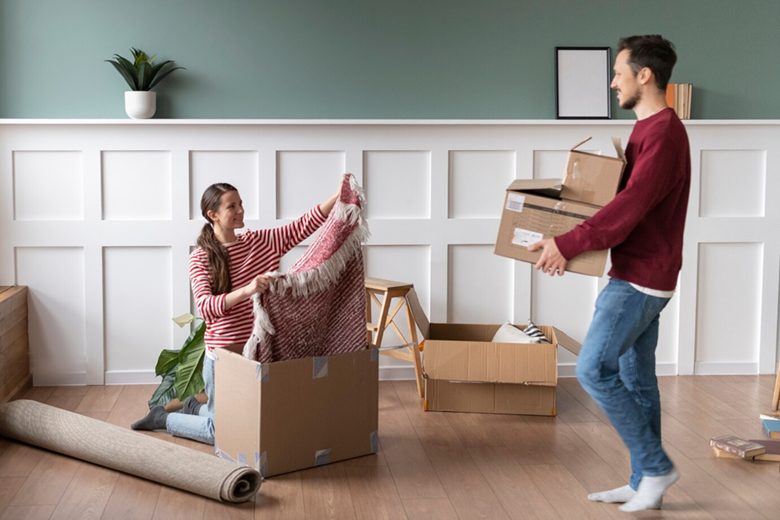Image: Freepik
Guest Article by Jim McKinley
There’s a strange moment in every move—the boxes packed, your keys in a neat goodbye pile, your GPS recalibrated to somewhere unfamiliar—when you realize that you’re not just relocating. You’re restarting. A new city isn’t just a change in coordinates; it’s a reshuffling of routines, a reimagining of who you are in a new context. Moving well requires a little less Google Maps and a little more emotional cartography.
Following Your Daily Rhythms, Not Just the Skyline
When you fantasize about a new city, it’s easy to get swept up in postcard aesthetics. But your real life won’t be a panorama—it’ll be the small rituals. Ask yourself where you’ll get your morning coffee, where you’ll jog, where you’ll go when you need to cry. If your days revolve around quiet bookstores and farmers markets, a loud downtown high-rise might look great on Instagram but feel like sandpaper on your soul. Build a mental map not of landmarks, but of lifestyle compatibility.
Cost of Living Isn’t Just Math—It’s Mood
Sure, spreadsheets help when weighing rent against salary, but numbers don’t account for mental overhead. Can you walk instead of drive? Are groceries affordable enough that you can host impromptu dinners? Can you find cheap but meaningful entertainment, or does fun come with a cover charge? A city can be “affordable” on paper and still feel like it’s quietly bleeding your joy with every overpriced cocktail. Look for a place where your money buys experience, not just square footage.
Loneliness Wears Many Outfits
People don’t often tell you this, but moving—even when you’re running toward something wonderful—can hollow you out in unexpected ways. The newness gets exhausting. Friend groups are already formed, routines already humming. You don’t just have to show up, you have to insert yourself into spaces that weren’t waiting for you. The antidote? Sign up for things immediately. Potlucks, running clubs, book meetups, trivia nights. Awkwardness is the toll you pay to cross the bridge into belonging.
Work-Life Balance Depends on More Than Your Job
It’s tempting to think a great remote gig or career jump will anchor your life, but geography messes with that equation. Some cities breed burnout just by how they move—frantic commutes, long lines, constant noise. Others quietly nudge you to take your lunch outside or close your laptop at 5. Pay attention to whether a city complements your desired pace. Work is important, but so is what you come home to at the end of the day—and how long it takes you to get there.
A Fresh Start for Your Ambitions
Relocating isn’t just a logistical shift—it’s a rare, built-in excuse to reimagine what you do and who you want to be. If you’ve been stuck in a career that doesn’t light you up, a new city can act as the catalyst to finally chase that passion or pivot into a field that feels more aligned. Online degree programs make it easier than ever to make this leap without uprooting your finances or routine. By earning a master of healthcare administration, for example, you can deepen your knowledge of the healthcare system and grow into a leadership role with confidence and clarity.
Embracing the Errand Test
This one’s simple, but wildly effective: take a fake errand day in your potential new city. Go buy toothpaste. Return something. Get a haircut. How easy is it to navigate? Do people help when you ask for directions? How do you feel during the in-between moments—parking lots, waiting rooms, checkout lines? Cities reveal themselves most honestly in the mundane. If you can find calm and clarity in the errands, chances are you’ll find comfort in the rest.
Letting Yourself Mourn the Place You’re Leaving
Moving often comes with a pressure to be thrilled—fresh start! New chapter! But nostalgia is a stubborn tenant. Let yourself miss what you’re leaving. Write a goodbye letter to your favorite park. Take a last walk through your neighborhood without music. Grieving doesn’t mean regretting. It means honoring the life that brought you to the edge of this next one. The more honestly you say goodbye, the more freely you’ll step into what’s ahead.
Watch for the Small “Yes” Moments
Eventually, your new city will start talking back. You’ll find a bench that feels like yours. A barista will remember your name. You’ll take a wrong turn and discover a mural that knocks the wind out of you. These little affirmations won’t arrive with confetti—they’ll just quietly signal that you’re exactly where you need to be. Stay open to them. They’re your welcome committee, even if they don’t introduce themselves.
There’s a difference between moving and arriving. One is about logistics; the other is about presence. The real work of relocating isn’t just unpacking boxes—it’s slowly stitching your life back together with new thread. So take your time. Be gentle with yourself. And know that the version of you who thrives in this new city is already waiting—you just need to meet them one small discovery at a time.
Discover your dream home along the Emerald Coast with expert guidance from realtor Susan De León.
Start your home-buying journey today!

 Facebook
Facebook
 X
X
 Pinterest
Pinterest
 Copy Link
Copy Link
